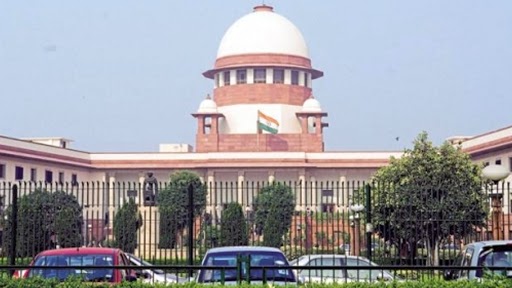New Delhi, May 4: The Supreme Court on Wednesday will pronounce its verdict on a batch of petitions, which have challenged the Bombay High Court decision upholding grant of reservation to the Maratha community in admissions and government jobs in the state.
A five-judge constitution bench headed by Justice Ashok Bhushan will pronounce the verdict, which was reserved on March 26. The Constitution bench had commenced the arguments in the matter on March 15.
The Centre had told the Supreme Court that it is of view that the Maharashtra government can grant reservation to Maratha community in public education and employment. Maharashtra Reports 51,880 New COVID-19 Cases, 891 Deaths in Past 24 Hours.
Solicitor General Tushar Mehta, representing the Centre, said the decision of the Maharashtra government is constitutional as the 102nd Amendment does not remove a state of the power to declare its list of Socially and Educationally Backward Classes (SEBC).
Emphasising that the Maharashtra government granting reservation to Maratha community is constitutional, he said the Centre adopts the submissions of Attorney General K.K. Venugopal and these should be taken as Centre’s view.
The AG had also submitted before the apex court that the 102nd Amendment does not take away power of the state legislatures to ratify a law to determine the SEBC and then confer benefits on them.
The hearing in the matter saw submissions being made on whether the landmark 1992 Indra Sawhney verdict (called the Mandal judgement), which capped reservation by 50 per cent, requires re-consideration by a larger bench.
Several states, including Karnataka, have expressed support for more than 50 percent reservation in jobs and education, depending upon the necessity and quantifiable data. Maharashtra’s Daily COVID-19 Deaths, Cases Shoot Up Again, but Situation in Mumbai Improves.
They had cited the 103rd Constitutional Amendment on 10 percent Economically Weaker Section (EWS) quota, to contend the Constitution itself now permitted reservation beyond 50 percent. Petitioners who have challenged the Maratha quota said there was no need to reconsider the nine-judge bench in the Indra Sawhney case.
A batch of petitions challenged the Bombay High Court verdict which upheld 12 to 13 per cent reservations for Marathas in jobs and education under the Maharashtra Socially and Educationally Backward Classes (SEBC) Act, 2018. In December last year, the top court had declined to modify the stay order in implementing reservation for Marathas in job and education in Maharashtra.
(The above story first appeared on Today News 24 on May 04, 2021 11:47 PM IST. For more news and updates on politics, world, sports, entertainment and lifestyle, log on to our website todaynews24.top).


